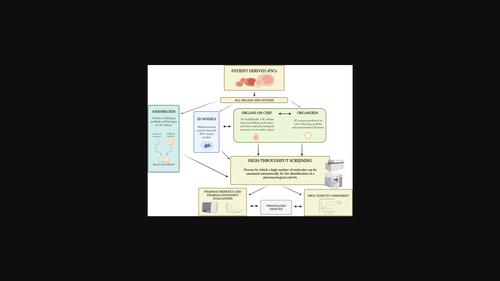当前位置:
X-MOL 学术
›
WIREs Mech. Dis.
›
论文详情
Our official English website, www.x-mol.net, welcomes your feedback! (Note: you will need to create a separate account there.)
iPSCs as a groundbreaking tool for the study of adverse drug reactions: A new avenue for personalized therapy
WIREs Mechanisms of Disease ( IF 3.1 ) Pub Date : 2023-09-28 , DOI: 10.1002/wsbm.1630 Paola Rispoli 1 , Tatiana Scandiuzzi Piovesan 1 , Giuliana Decorti 1, 2 , Gabriele Stocco 1, 2 , Marianna Lucafò 3
WIREs Mechanisms of Disease ( IF 3.1 ) Pub Date : 2023-09-28 , DOI: 10.1002/wsbm.1630 Paola Rispoli 1 , Tatiana Scandiuzzi Piovesan 1 , Giuliana Decorti 1, 2 , Gabriele Stocco 1, 2 , Marianna Lucafò 3
Affiliation

|
Induced pluripotent stem cells (iPSCs), obtained by reprogramming different somatic cell types, represent a promising tool for the study of drug toxicities, especially in the context of personalized medicine. Indeed, these cells retain the same genetic heritage of the donor, allowing the development of personalized models. In addition, they represent a useful tool for the study of adverse drug reactions (ADRs) in special populations, such as pediatric patients, which are often poorly represented in clinical trials due to ethical issues. Particularly, iPSCs can be differentiated into any tissue of the human body, following several protocols which use different stimuli to induce specific differentiation processes. Differentiated cells also maintain the genetic heritage of the donor, and therefore are suitable for personalized pharmacological studies; moreover, iPSC-derived differentiated cells are a valuable tool for the investigation of the mechanisms underlying the physiological differentiation processes. iPSCs-derived organoids represent another important tool for the study of ADRs. Precisely, organoids are in vitro 3D models which better represent the native organ, both from a structural and a functional point of view. Moreover, in the same way as iPSC-derived 2D models, iPSC-derived organoids are appropriate personalized models since they retain the genetic heritage of the donor. In comparison to other in vitro models, iPSC-derived organoids present advantages in terms of versatility, patient-specificity, and ethical issues. This review aims to provide an updated report of the employment of iPSCs, and 2D and 3D models derived from these, for the study of ADRs.
中文翻译:

iPSC 作为药物不良反应研究的突破性工具:个性化治疗的新途径
通过重新编程不同类型的体细胞获得的诱导多能干细胞(iPSC)是研究药物毒性的一种有前景的工具,特别是在个性化医疗的背景下。事实上,这些细胞保留了与供体相同的遗传基因,从而可以开发个性化模型。此外,它们还是研究特殊人群(例如儿科患者)药物不良反应(ADR)的有用工具,由于伦理问题,这些患者在临床试验中往往表现不佳。特别是,iPSC 可以分化为人体的任何组织,遵循几种使用不同刺激诱导特定分化过程的方案。分化的细胞还保留了供体的遗传遗传,因此适合个性化药理学研究;此外,iPSC 衍生的分化细胞是研究生理分化过程潜在机制的宝贵工具。iPSC 衍生的类器官是 ADR 研究的另一个重要工具。准确地说,类器官是体外 3D 模型,从结构和功能的角度来看,它都能更好地代表天然器官。此外,与 iPSC 衍生的 2D 模型一样,iPSC 衍生的类器官是合适的个性化模型,因为它们保留了供体的遗传遗产。与其他体外模型相比,iPSC 衍生的类器官在多功能性、患者特异性和伦理问题方面具有优势。本综述旨在提供 iPSC 使用情况的最新报告,以及由此衍生的 2D 和 3D 模型,用于 ADR 的研究。
更新日期:2023-09-28
中文翻译:

iPSC 作为药物不良反应研究的突破性工具:个性化治疗的新途径
通过重新编程不同类型的体细胞获得的诱导多能干细胞(iPSC)是研究药物毒性的一种有前景的工具,特别是在个性化医疗的背景下。事实上,这些细胞保留了与供体相同的遗传基因,从而可以开发个性化模型。此外,它们还是研究特殊人群(例如儿科患者)药物不良反应(ADR)的有用工具,由于伦理问题,这些患者在临床试验中往往表现不佳。特别是,iPSC 可以分化为人体的任何组织,遵循几种使用不同刺激诱导特定分化过程的方案。分化的细胞还保留了供体的遗传遗传,因此适合个性化药理学研究;此外,iPSC 衍生的分化细胞是研究生理分化过程潜在机制的宝贵工具。iPSC 衍生的类器官是 ADR 研究的另一个重要工具。准确地说,类器官是体外 3D 模型,从结构和功能的角度来看,它都能更好地代表天然器官。此外,与 iPSC 衍生的 2D 模型一样,iPSC 衍生的类器官是合适的个性化模型,因为它们保留了供体的遗传遗产。与其他体外模型相比,iPSC 衍生的类器官在多功能性、患者特异性和伦理问题方面具有优势。本综述旨在提供 iPSC 使用情况的最新报告,以及由此衍生的 2D 和 3D 模型,用于 ADR 的研究。



























 京公网安备 11010802027423号
京公网安备 11010802027423号